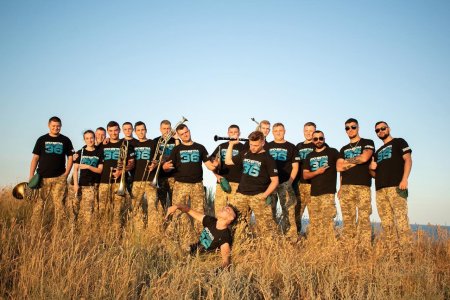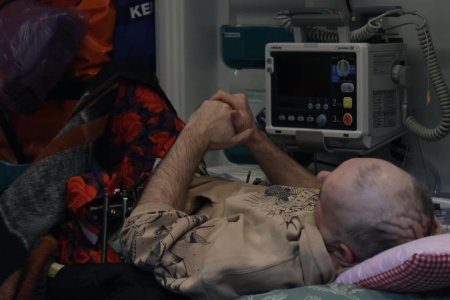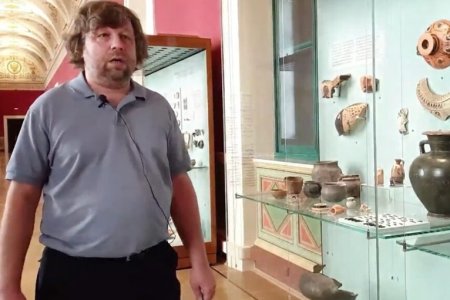
Sadists by official duties
“...I crawl, and they kick me in the head and jump on me. I crawled about 30 meters, and all this time they kicked me, and used an electric shocker on me…” Such is a former prisoner of war’s recollection of just one day in captivity. And how many similar days did each of those who were or remain in captivity endure?
Ukrainians are tortured by employees of special forces units (“spetsnaz”), employees of “FSIN” — the Federal Service for the Execution of Sentences (not only direct overseers, but sometimes also doctors, dog handlers, etc.), and representatives of the Federal Security Service (FSB). Sometimes, but much less often, former prisoners recall executioners among the Russian military and militants of quasi-republics.
— We were beaten by special forces and employees of the FSIN, — recalls the witness. — The FSIN employees were in blue uniforms. There were also dog handlers. They would put dogs in cages, take some tool, and participate in beatings and torturing prisoners…
— The “Efesbeshniks” had FSB patches and black uniforms (FSB — Federal Security Service of the Russian Federation). Guys from so-called Donetsk People Republic themselves said where they were from, says another. — The Chechens were more lenient; they respected age, if someone was wounded, they didn’t beat them.
When captured, Ukrainians could spend several days in premises unsuitable for human detention, such as barns, hangars, and cattle pens. The conditions there were terrible, but, as several former prisoners noted, “at least they didn’t beat us in such places.” Later, the Ukrainians were briefly transferred to one of the penal institutions or pre-trial detention centers in the occupied Ukrainian territories, for example, to Olenivka. Here, it was decided where to send them. Within a week, the prisoners were taken to pre-trial detention centers and penal colonies in the territory of the Russian Federation. After some time, a new “journey” took place, deep into the aggressor state. And the further from their homeland the Ukrainians were taken, the crueler the treatment was. Often, the same executioners would follow the prisoners on a “business trip”.
Business Travelers
— When we were in Mordovia, we recognized by their voices the special forces who were in Bryansk, — says one of the Ukrainian soldiers released from captivity. — These special forces conducted checks, took us for walks, and to the bathhouse.
Others say the same. They remembered the “war name” of one of the guards who accompanied the prisoners during numerous transportations — “Bison”.
It should be noted right away that these seemingly innocent phrases about “walks and a bathhouse” are not at all about fresh air and washing. These activities are often accompanied by something else: forced walking in a bent-over position, torture in the outdoor spaces, demands to wash with cold water, and shave, all in a couple of minutes — otherwise it is punishment. All accompanied by beatings — at every step.
Human rights activists suggest that dedicated teams of special forces and FSB officers were created in Russia, who “tour” various penal institutions and “professionally” torture prisoners. Prisoners sometimes call such “professionals” "business travelers”. They were typically characterized by their exceptional cruelty and a sense of complete impunity.
— ...The “travelers” arrived, and there was one person who, during the inspection and during ... the bath, brutally beat everyone with a plastic pipe, — recalls a witness to a camp in Mordovia. — He beat us on the back and legs... Such blows left wounds on the body, from which blood flowed, and when they healed, they looked like burns. For a whole month, this happened every day, and several times twice a day. This employee forced me to squat either 1,000 or 2,000 times. From the end of June to mid-August 2023, there were “touring” teams that beat exclusively marines. They forced me to simulate swimming in water, and they shouted at us and said that an electric eel had caught us, and they beat us with electric shockers on the body. We called one of them “Tuk-tuk” (“knock-knock”) because he was knocking on the door. He had a comrade. When they beat the entire corps, they threatened they could kill two or three people, and would get nothing for it, because they would be written off as COVID victims.
The presence of such special “touring” teams, according to human rights activists, indicates that torture of prisoners is part of the Russian Federation’s state policy.
— They probably used torture, and other employees, in particular from the Federal Penitentiary Service, helped with this…, — suggests Mykhailo Romanov, author of the study “Torture of Ukrainian prisoners of war in places of detention in the Russian Federation.” — If this were really the case, we can also safely assume that there was a specific order to carry out such “torturous” persecution of prisoners in places of detention in the Russian Federation to cause them maximum harm, intimidation, humiliation, etc. This, in turn, is a manifestation of a unified approach and coordinated activity towards Ukrainian prisoners, a kind of policy towards them.
Uncle from Taganrog
Pre-trial detention center № 2 in Taganrog is now in the news. It was there that Ukrainian journalist Viktoria Roshchyna was held for a considerable period, a fact that remained secret for a long time. The former head of the pre-trial detention center, Oleksandr Shtoda, was investigated in absentia by Ukrainian law enforcement officers on suspicion under Part Two of Article 28, Part One of Article 438 of the Criminal Code of Ukraine — cruel treatment of the civilian population committed by a group of persons in a “prior conspiracy”.
— …During the interrogation, they beat me with fists and kicks, — says N. — As I understood it, it was a local operative officer who was interrogating me. There were two guys from special forces nearby. This police officer pretended that he was good, while everyone else was bad. While this officer was talking to me, no one beat me, and only when he left did they start beating me. When he came back, he asked, ’Why are you beating him?’ …The interrogation lasted about a couple of hours, and all this time, this police officer left and came back, and these two special forces officers beat me.
Ukrainians especially remembered an employee of the Taganrog pre-trial detention center nicknamed “Uncle Vanya”. He was a big man who had been a boxer. Now he practices his skills on those who cannot defend themselves.
Former prisoners say that Chechens were on duty in the pre-trial detention center in the city of Kamyshin (Volgograd region). Their faces were covered with masks, and prisoners were not allowed to raise their heads, so they could not see their executioners. Their names could be found only by accident.
— They beat me with a taser in the area of my legs and buttocks; they clamped the taser so that it worked for a few seconds, and then they pressed it to my body and ran it along my back from my neck to my tailbone; they hit my fingers. While leaving, I heard the name “Inspector Mikhailov,” says M.
Other prisoners also remember this inspector. Additionally, a tall, thin major, representing the Investigative Committee, came to conduct interrogations.
In the testimonies about SIZO No. 2 in the city of Ryazsk (Ryazan region), two surnames appear: FSB operative Galitsky and SIZO employee Pavel Bykov. Only names or nicknames are known about the others — Sasha, San Sanych, Roman, Maksym, “Lieutenant Colonel Semyechkin.” His cruelty especially distinguished a certain Zhenya. He turned off the video surveillance cameras in the corridor, took the prisoners out, and beat them just for the sake of it, for entertainment.
— Once Zhenya beat me so severely that I had to be carried to the medical unit, — says A.
— …There were two FSIN employees, including Zhenya, and the third was a special forces officer. They beat us in the corridor, with hands, feet, elbows all over our bodies, but they didn’t hit us in the head. They beat us for 5-10 minutes. I think this special forces officer was a Thai boxer, because he beat us professionally and hard.
In the pre-trial detention center in the city of Kashin (Tver region), the attitude towards prisoners was no better.
— …At the reception, they beat me with a wooden hammer on the ribs, head, back, and back of the head, and I had bruises. Oleksandr Romanovich beat me. He was short and constantly carried a hammer.
Ukrainians name many call signs of special forces officers who participated in the torture in Kashin: “Yermak,” “Plyemyash,” “Losyak”, “Baikal”, “Sausage”, “Valdai”, “Tikhiy”. They also recall the blond employee of the pre-trial detention center, Andrey, who wore a gold watch and carried a red iPhone X. The special forces were often in a state of alcoholic or drug intoxication, and according to descriptions, their behavior was generally inadequate.
Mordovia. Doctor Evil
Terrible torture, hunger, the requirement to stand motionless in one place for hours, awful living conditions, unsanitary environment, lack of medical care — Mordovia colony № 10 is considered the most terrible in the Russian Federation.
— The shift of pre-trial detention center employees was drunk, they gave us the command “run in place”, and we ran for 2-3 hours, — says O. — The drunk employees forgot about us, and then when they came to the building, they were surprised why the whole building was running. When they looked into our cell, they opened a window in the cell door and forced everyone to stick their heads through it.
The guards beat everyone who peeked out on the head with rubber batons until they got a concussion, everyone felt nauseous, dizzy, and had bruises.
The interrogations here were called “Gestapo”, and a few of us returned unharmed. The torturers in the colony were certain Zhuravlev, as well as people with the call signs “Baikal”, “Tinky-Winky”, and “Kamaz”. But the most bitter memories are about a local doctor who was distinguished by his inhumane attitude towards prisoners. The prisoners nicknamed him “Doctor Evil”.
— Three doctors in the colony took turns. One of them was “Doctor Evil”. If some had health problems, they were treated with an electric shock.
Once, one of the prisoners felt sick and lost consciousness. A doctor was called.
— We heard wild screams in the corridor, because he was beating everyone with a stun gun and shouting: “They still dared to call me? Now I will cure them all!” ...We heard the words of the doctor, who said that he would not even enter this cell, because he knows who was in this cell with us (previously, Russian convicts who were sick with tuberculosis were kept here).
— You stick your hand out the window (for the pill — ed.), and he hits you with a stun gun and asks: “Are you better?” You have to answer — Yes, otherwise he will increase the power and shock you again.
Radio Liberty journalists identified Doctor Evil. He turned out to be 34-year-old Ilya Sorokin, a father of two children. He was awarded a diploma “for conscientious performance of public duties and active participation in the life of the collective”. In 2024, he went to serve in the army.
Human rights activists believe that the institution’s leadership could not have been unaware of what was happening in the colony, so it must also bear full responsibility for the torture and violation of the prisoners’ rights. Until March 13 last year, IK-10 was headed by Serhiy Zabaykin, and since then, it has been headed by Oleksandr Hnutov. His deputies are Oleksiy Anashkin, Yegor Averkin, Oleksandr Grishanin, Ivan Veshkin, and Semyon Kuznetsov.
Lawyers from the Kharkiv Human Rights Protection Group have concluded that the Russians are not only grossly violating the Geneva Convention on the Treatment of Prisoners of War, but are also committing a war crime — torture. In addition, there is every reason to believe that such treatment of prisoners is part of a single, coordinated state policy aimed at the destruction and humiliation of Ukrainian defenders. The indications are in the systematically, large-scale, and repetitive nature of the crimes committed by Russians against those who have fallen into their captivity.



